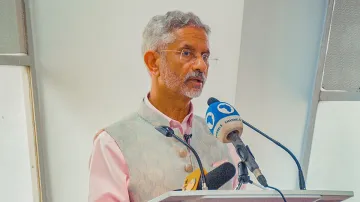Globalisation being weaponised by 'dominant players', currency and trade used as weapons: Jaishankar
The minister said the Global South is about a "mindset, a solidarity and a self-reliance" and the world can't progress without the advancement of the Global South. He also stressed that restoring the world to its natural diversity is a "collective objective".

Lagos: During his three-day visit to Nigeria, External Affairs Minister S Jaishankar on Monday spoke about how globalisation is being dominated by "dominant players" with currency, trade and tourism being used as "weapons". The minister elaborated on the negative side of globalisation, where a majority of economic power is concentrated in the hands of a handful of nations, upon which most countries depend.
Addressing the Nigerian Institute of International Affairs (NIIA) in Lagos, Jaishankar noted that the world order established in 1945 persists, with those in control reluctant to create more opportunities for others. "When I spoke about globalisation and concentration a different challenge emerging out of that is how globalisation itself has been weaponised that today, currency is a weapon, trade is a weapon, tourism is a weapon... Dominant players they may be dominant as producers they may be dominant as consumers that they often with very little hesitation leverage their market shares on the global system for their particular national purpose," he said.
Jaishankar said the world order developed in 1945, when the UN was formed, was a time when the members were roughly 25 per cent of what they are today and that those in the "driving seat" don't want to create more seats for other people. Notably, UN Secretary-General Antonio Guterres also flagged the issue by questioning why there were no permanent members from Africa in the UN Security Council.
Global South is a mindset, self-reliance: EAM
"The global agenda in many ways today is about restoring the world to its natural diversity because the world was diverse the world is diverse it was distorted by the period of Western domination and in a post-Colonial world today restoring that natural diversity is actually a collective objective," adding that countries who dominated the world for the last two or three centuries continue to do the same with new instruments and regimes.
The EAM said the Global South is about a "mindset, a solidarity and a self-reliance" and without the advancement of the Global South, the world is not going to see planetary progress. He termed contemporary globalisation as a combination of "economics of interdependence of interpenetration of a shared common dependence or technology of a degree of mobility". Jaishankar also stressed that world today needs to be de-risked from over-concentration, citing the problems faced by countries during the COVID-19 pandemic.
"We were often dependent on suppliers and producers from far away not just dependent on them as we discovered during COVID we were hostage to them that many of us struggled with masks and gloves and PPEs and ventilators and basic medicines and vaccines, we struggled for food. So, one of the big takeaways from the COVID experience is our world today needs to be de-risked from the over-concentration that if you speak about a more balanced world," he said.
He also highlighted India's challenges in combating the polarisation of the world during the G20 presidency, when world leaders were divided on the Russia-Ukraine war. "The developmental issues have polarized the North and the South so how do we today talk of a global agenda when the globe itself is so divided that is a challenge in itself," Jaishankar added.
Jaishankar on India-Nigeria relations
Jaishankar co-chaired the 6th Joint Commission Meeting between India and Nigeria at Abuja along with his counterpart Yusuf Tuggar also discussed opportunities in the sectors of power, renewables, transport, healthcare, fintech, agriculture and security between the two countries. He said that both sides have agreed to strengthen people-to-people exchanges, energy, mobility and others, drawing strength from the diplomatic relations between India and Nigeria that have “existed for a very long time”.
“Co-chaired the 6th Joint Commission Meeting along with FM @YusufTuggar. Noted the expansion of our economic cooperation, especially trade and investment. Discussed new opportunities in energy, power, renewables, transport, healthcare, fintech, agriculture and security," Jaishankar said in a post on X.
Terming Nigeria as an important business partner of India, Jaishankar said, “We have about 130 Indian companies that have really put their economic future, struck roots in this country, to a point where they have actually become one of the largest employers in this country. Jaishankar also addressed two business forum meetings, addressed a Nigerian think tank, met with the Indian community and unveiled a bust of Mahatma Gandhi.
“Our effort today is … at a time when technology is changing, economics is changing, world politics is changing … how do we build a relationship which is in tune with the needs of the future for two democratic countries with an inclusive socio-economic outlook," said the minister while addressing a joint press conference.
Jaishankar also said that the relationship between India and Nigeria has evolved from being historical friends to becoming strategic partners. "India and Nigeria, we share a long-standing and friendly relationship, which is really rooted in history in many ways. We are the largest democracies of the world and we are leaders in our own continents as well," he added.
(with inputs from agencies)
ALSO READ | Jaishankar presents India as 'Vishwa Mitra' at NAM Summit, pushes for reformed multilateralism